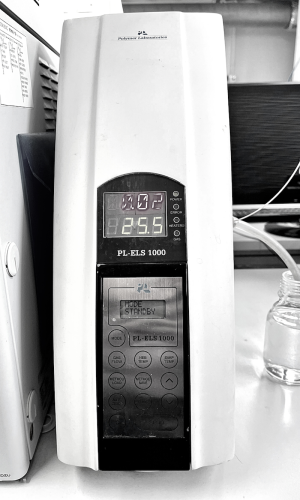The light scattering detector (ELSD) is a universal detector similar to the RID detector, but more sensitive and enabling work in a gradient, unlike the RID (which is its serious limitation).
It enables the detection of even those chemical compounds that do not have chromophore groups and thus do not absorb UV radiation, such as sugars, lipids, surfactants or synthetic polymers. Provides good sensitivity for non-volatile analytes, but is not suitable for volatile substances analysis.
After leaving the chromatography column, the eluate is nebulized and then evaporated to form fine particles. The detector measures the light scattering by the formed nanoparticles.
Application:
In the laboratory, we most often use this type of detector for the analysis of sugars, surfactants and high molecular weight analytes. He often saves us from “oppression” when no other detector “makes it”.

